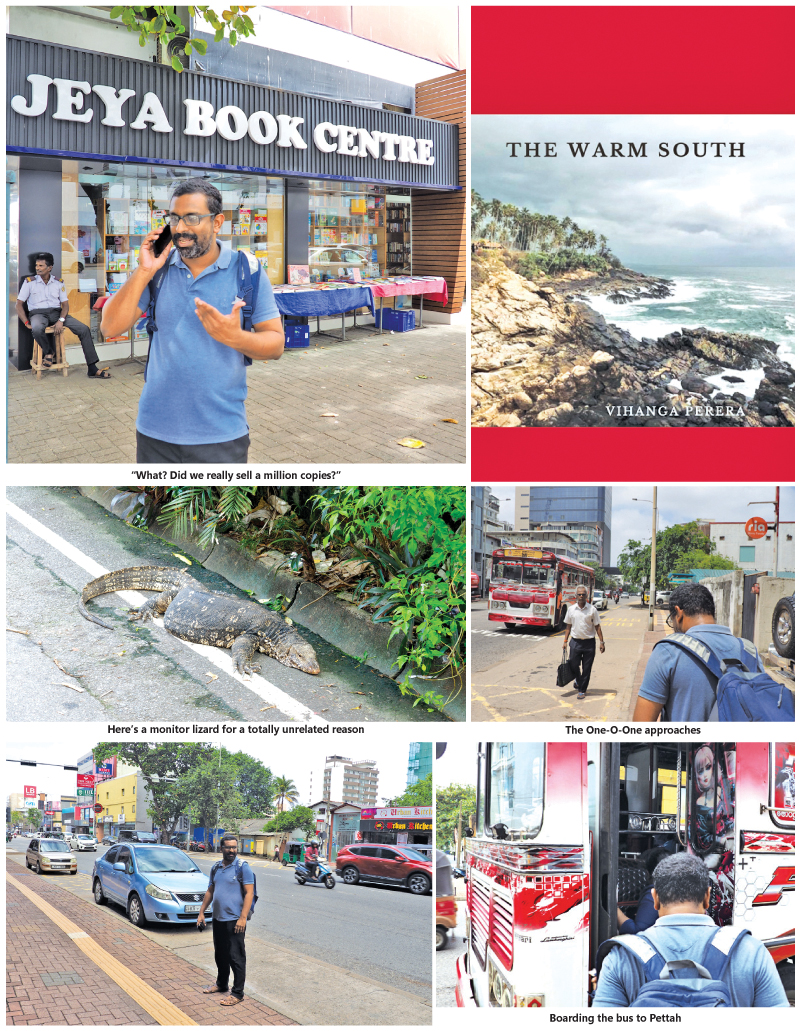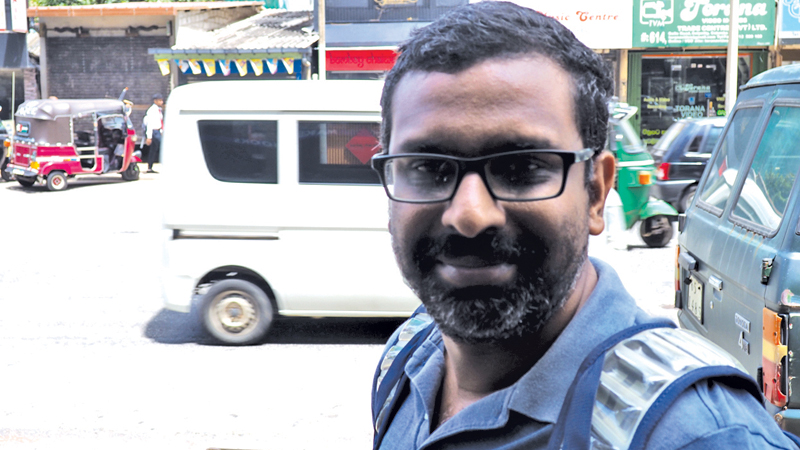 He arrives saddled up with a backpack and an ugly grey polo. The un-apologetic: “Bajaar Hemingway,” if you will.
He arrives saddled up with a backpack and an ugly grey polo. The un-apologetic: “Bajaar Hemingway,” if you will.
Call him a bus route cowboy or a bookstore cowboy. His name is his ‘nom de guerre’, Vihanga Perera; if you consider the man’s writing, a perpetual war against kitsch in the literary world.
Vihanga made it to the Gratiaen shortlist this year with ‘The Warm South’ – a story about a group of friends going to Tangalle on a road trip.
A daily newspaper interviewed Vihanga in May; something about “writer’s block, risk and recognition”. But as you know, we at Observer MUSE love to do things differently, plus this writer has hometown privileges with Vihanga.
So on a beautiful Thursday morning, I fired a WhatsApp voice message about doing a “bro” a “solid” and we met up for some 10 am Americano in Bambalapitiya.
Undiluted
“Serve a little milk with mine,” I asked the barista. Vihanga declined to dilute his – which is also true to his writing style:
You shouldn’t budge from what you want to do as a writer, Vihanga explained. “You should pull your readers up instead of lowering yourself. Don’t compromise on impulse”.
As we are in an age of attention economy and social media feeds created by the algorithm, I asked if any of his work passes the vibe check.
A lot of writers are checking boxes and writing to certain markets, and are inadvertently or knowingly pushing agendas, making us question the honesty of the writing, he said.
For example, Vihanga said the First World has defined a niche for writers from Asia and Africa. When it comes to the literary genre from the Global South, there are certain authors who perform for certain topics. “The big publication houses push a certain publication culture on Third-World and migrant writers.
The elements in this genre include political chaos, inter-class and inter-caste divides, primitive tensions (according to neo-colonial narratives), gender and ethnic violence and constant conflict.
When these stories become the standard, aspiring writers from the Third World internalise these narratives”.
So, who is this guy?
For those who don’t know, Vihanga has been writing around for 20 years and his books have made it to Gratiaen lists half a dozen times. He won the Gratiaen in 2014 for ‘Love & Protest’ and has won the State Literary Award in 2015, 2023 and 2024. He has written seven novels, five poetry books and two collections of short stories. Vihanga also writes columns on arts and culture for local newspapers. The guy has also been thespian back in his Kingswood days and is a Pera grad.
Vihanga’s earns his keep as researcher in English and as a university lecturer. His papers have been published in the Journal of Commonwealth Literature, Postcolonial Text and The State Crime Journal.
Impressive? Yes! But Vihanga shuns the spotlight. Rumour has it that he showed up to the Gratiaen Awards all scruffy with his backpack, like he had just got off the 138 as it coasted to a stop.
During our interview he made a confession: “I didn’t feel like coming inside (Cinnamon Life) because I have this fear of tall buildings. I was so scared that I tucked my shirt before coming inside. Another writer, Carmel Miranda was surprised to see me with my shirt tucked!”
The scene
Regarding literary zeitgeist, Vihanga said this years’ Gratiaen was a breakthrough in many ways. There were outsiders, he said, like Savin Edirisinghe (Who won this year’s award for his book ‘Kata Katha: Gossip, Rumours, and Idle Talk’). “With regard to the shortlist, writers like Ajith Perakum, who represents a totally different scene, had entered the Colombo-centric English literary arena. Twenty years ago the Gratiaen was a totally different thing”.
Vihanga said that it was interesting to see Sinhala writers making into the English literary scene. For example he says, P.B. Jayasekara – a Sinhala author with a big body of work with a lot of politically accented writing made it to the final three of the State Literary Awards for English Fiction last year.
On the rise of AI, Vihanga thinks that while people are still cautious about the new technology, it will ultimately become second nature. He laughs: “Even when some of my students write in class, the prose comes out like something written by AI”, meaning that AI style has permeated somewhat in how we use language even in the absence of any device.
“We will have to rethink in terms of the humanities. Personally, I have never tried ChatGPT,” he says.
“Not even for fun?” I ask.
“No not even for fun. A few years ago we started using social media like Facebook and Instagram for ‘fun’ but now we are using them to topple regimes”.
Bookstore Cowboy
We exited the coffee shop and continued the interview on-foot up the Galle Road in the direction of Jeya Bookshop.
“What are we going to find there?” I asked
I want to check if they have the same stuff they have in Pettah, he said half-jokingly.
Colombo’s best bookstore was the next question. Is it Gamini Hall junction where they have all the used books?
“They certainly know what they are selling. That makes them the best. There is a close competition. Sarasavi is doing good. Gunasena is coming up There is no ‘best’ per se. They are just trying to stay abreast of each other”.
“So it’s a bookshop war?” I asked.
Not on the surface, Vihanga replied. “Maradana definitely, because they have an appeal the others don’t have”.
Vihanaga, however, does all the publishing and distributing himself. “It’s hard to deal with big bookshops. I have nothing against bookshops, but life is easier when you do your own stuff,” he explained.
We hauled over to Makeen which was two stops from Jeya. We browsed the first floor and we climbed up to the second after finding nothing of interest.
Vihanga pointed to a row of neatly stacked “Fifty Shades of Grey” books. “’Ela’ James, he said referring to the author’s initials: E.L.
“These books stirred in a new discourse in Sri Lanka. People started writing ‘sexy’ stuff,” he said.
“What do you think about the self-help scene?” I asked.
Vihanga looked at me just laughed.
“Is it a valid literary genre?”
“It sells. People need help”.
“They fly off the shelves right?”
“Yeah. They give you the illusion of offering you something”.
Our browsing ended after a few minutes and we caught a 101 to Pettah. Vihanga gave the conductor the exact amount for the number of stops (because he is also the Bus Route Cowboy). I got off at Lake House and he told me he is going to carry on ahead to Pettah – to Jeya Bookstore at the People’s Park.








